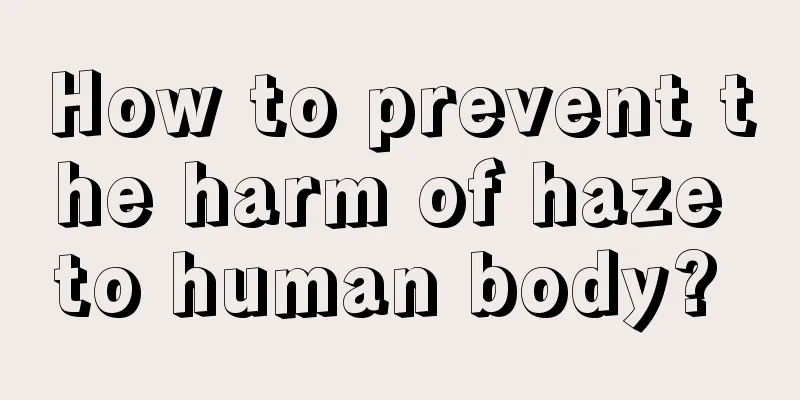How to prevent the harm of haze to human body?

|
With the continuous development of modern industry and social economy, environmental problems are becoming more and more serious, especially the increasing amount of haze and the sharp decline in air quality, which will bring a lot of harm to the human body. In fact, there are many diseases caused by poor air quality. If you want to prevent the harm caused by smog, you can take measures such as reducing going out and outdoor exercise, closing doors and windows, and paying attention to your diet! The details are as follows. 1. Reduce going out The elderly and children with weak immunity and susceptible people with respiratory diseases should try to reduce going out or outdoor activities. When going out, they should wear masks to protect their bodies and prevent pollutants from invading the lungs through the nose and mouth. After returning from outside, they should immediately wash their faces and exposed skin. 2. Reduce outdoor exercise In haze weather, the air pressure is low, the visibility is low, and a large amount of toxic particles such as dust are suspended in the air. Patients with chronic respiratory diseases such as bronchial asthma, chronic bronchitis, obstructive pulmonary emphysema and chronic obstructive pulmonary disease should try to avoid outdoor exercise to avoid triggering or aggravating chronic diseases. Similarly, the pressure is low in foggy weather, so patients with chronic diseases such as hypertension and coronary heart disease should not do outdoor exercise to avoid inducing angina pectoris and heart failure. Moderate and severe haze weather can easily cause irritation to the human respiratory and circulatory systems, especially in the morning when the air quality is poor. Generally speaking, if there is no cold air activity and weather such as rain, snow, and strong winds, the best time to exercise is from morning to evening when the air quality is good and visibility is high. The best location is where there are many trees and grass. In hazy weather, the amount and intensity of exercise should be reduced appropriately. 3. Close doors and windows Because pollutants in the air are difficult to dissipate during foggy weather, doors and windows should be closed in foggy weather to prevent outdoor fog from entering the room and polluting the indoor air, which may induce acute respiratory and cardiovascular diseases. 4. Pay attention to your diet Patients with chronic respiratory diseases, especially the elderly, should maintain a scientific lifestyle, avoid excessive fatigue, and drink plenty of water. Pay attention to eating a light diet, eat less irritating food, eat more tofu, milk and other foods, and supplement vitamin D when necessary. 5. Be extra careful when driving or walking In moderate and severe haze weather, visibility is low and sight lines are poor. People driving, cycling and walking should be more careful, especially when passing intersections and unattended railway crossings. They should slow down, obey traffic regulations and avoid traffic accidents. |
<<: Preparation, efficacy and side effects of Houttuynia cordata extract
>>: What should I pay attention to when shingles scabs?
Recommend
What kind of water can cause liver cancer? To prevent liver cancer, don't eat these things
Nowadays, liver cancer and other cancers are freq...
What are the prevention methods for liver cancer? Suggestions for preventing liver cancer in this way
The incidence of liver cancer is getting higher a...
What is the difference between a thorn monkey and a flat wart
There is no difference between warts and flat war...
Do you know the symptoms of glaucoma?
Glaucoma is a very common disease. Its early symp...
What to do if your lips are dry
Dry lips is a common phenomenon caused by the dry...
Daily diet for cervical cancer patients
Cervical cancer is a gynecological disease that w...
I drank alcohol after getting the rabies vaccine
After being bitten by a dog, you must get a rabie...
How to defrost the refrigerator
Now that living conditions are better, almost eve...
Can I use a breast pump when weaning?
When it comes to weaning their babies, parents mu...
Hair loss due to air conditioning
In the summer, because of the hot weather, everyo...
Facial muscle depression
When girls are young, they especially look forwar...
A review of osteosarcoma treatment methods
Osteosarcoma, everyone is unfamiliar with the wor...
How to straighten bow legs
Bow legs, commonly known as "O-legs", a...
What is the best way to treat gastroptosis?
Gastrointestinal health has always been a concern...
The harm of bubble gum
I believe everyone knows about the snack called b...









